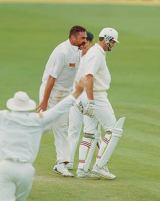No chat, no Ashes
Taunts and insults are as much a part of cricket as bats and balls, and never more so than during the Ashes
Simon Briggs
21-Nov-2006
|
|

|
According to Cricket Australia, the word "Pom" does not constitute racial abuse in itself. But if the word is linked with anything "hurtful... racist, offensive or humiliating", perpetrators could be ejected from grounds at this year's Ashes.
That was the ruling handed down recently, with a solemn air of finality. But if these guidelines were applied to the letter, they would soon become a laughing stock. That way the only people left in the Gabba by close of play on November 23 would be 11 English cricketers, two umpires, and a few thousand members of the Barmy Army.
Taunts and insults are as much a part of cricket as bats and balls, and never more so than during the Ashes. The England-Australia Test match of 1882 hinged on an almighty set-to between the great fast bowler Frederick "The Demon" Spofforth and WG Grace, who scandalously ran out Australia's Sammy Jones when he left his crease to do a spot of gardening on the pitch.
At the change of innings Spofforth stormed into the England dressing room, called Grace a 'cheat', and warned him that "this will lose you the match". He was as good as his word, taking 7 for 44 as England fell eight runs short of their victory target of 85. That defeat prompted Reginald Shirley Brooks to write his famous obituary notice for English cricket, and the concept of the Ashes was born.
Most early sledging was annoying rather than directly abusive. Grace and his brother EM had a habit of distracting the batsman by talking while the ball was being delivered. But we do have a few references to more confrontational tactics. One contemporary of SF Barnes, the greatest bowler of the early 20th century, refers to his "humiliating verbal scorn".
|
|

|
At around the same time England's Jack Hobbs managed to rile Australia's notorious hard man Warwick Armstrong by standing his ground against an (unsuccessful) appeal for hit-wicket. "The Australians made a rare fuss," wrote Hobbs. "They gathered together in the field and confabulated. The chief offender was Warwick Armstrong, who got very nasty and unsportsmanlike, refusing to accept the umpire's decision. This upset me. I did not know whether I was standing on my head or my heels, with the consequence that two balls later I let one go, never even attempting to play it, and it bowled me. I still bear this incident in mind against Armstrong."
Much of this sounds strikingly modern today, although a current player would hardly be surprised by such a reaction from the fielding team, and would certainly not give his wicket away. He would also be unlikely to use - or even understand - the word "confabulated".
The term "sledging" was born in the early 1970s, and that is no coincidence: it was Ian Chappell's Australians who upped the ante in verbal aggression. Dennis Lillee was Chappell's enforcer-in-chief; as he wrote, "I'm just so pent up against the batsman that I let him have a bit of my tongue as he goes."
Chappell's men used sledging as a rough-hewn personality test: if you were tough enough to take it, they respected you and usually cut out the chat pretty quickly. But if you proved to be unsteady under fire, they proceeded to give you both barrels.
Perhaps the most sustained campaign of sledging ever seen in a Test series was the one mounted by Merv Hughes and the 1993 Australians against England's great white hope, Graeme Hick. "He was a real danger, we made no bones about it," Hughes said afterwards, "and the fast bowlers did target him. Because Graeme had such fantastic ability, we would test him in other ways."
Hughes's eclectic repertoire included "Does your husband play cricket as well?" and "Mate, if you turn the bat over you'll find the instructions on the other side." But there were plenty of less repeatable comments. The 1994 Wisden Almanack condemned Australia's captain Allan Border for "condoning, and not infrequently participating in, the sledging of opponents and umpires".
Under today's Code of Conduct, Hughes could not have been so blatant without earning himself a ban. Perhaps this is as it should be: if Hick had suffered all that bullying and victimisation in any ordinary workplace, he would have had a strong case for compensation.
At the same time, though, a balance needs to be struck. Too much nannying from well-meaning bodies like Cricket Australia, and cricket's great tradition of anecdotes and one-liners will slide slowly into the past.
Simon Briggs is a sports columnist with the Daily Telegraph